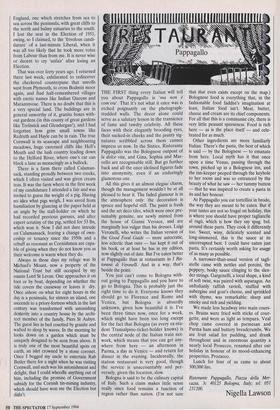THE FIRST thing every Italian will tell you about Pappagallo
is 'ma non e com'era'. That it's not what it once was is etched poignantly on the photograph- studded walls. The decor alone could serve as a salutary lesson in the transience of fame and tawdry celebrity. All these faces with their elegantly brooding eyes, their sucked-in cheeks and the jaunty sig- natures scribbled across them cannot impress us now. In the Sixties, Ristorante Pappagallo was the Bolognese outpost of la dolce vita, and Gina, Sophia and Mar- cello are recognisable still. But go further back and all the once idolised figures fade into anonymity, even if an enduringly glamorous one. All this gives it an almost elegiac charm, though the management wouldn't be at all pleased to hear it. The faded glamour is in the atmosphere only: the decoration is spruce and hopeful still. The paint is fresh and the art deco tiles, which were once pre- sumably genuine, are newly minted from the house of Gianni Versace, and are marginally less vulgar than his dresses. Luigi Veronelli, who writes the Italian version of the Good Food Guide — more autocratic, less eclectic than ours — has kept it out of his book, or at least he has in my edition, now slightly out of date. But I've eaten better at Pappagallo than at restaurants in I Ris- toranti di Veronelli. And in a way, that's beside the point.
You just can't come to Bologna with- out going to Pappagallo and you have to go to Bologna. This is probably just the right time to do it. Everyone knows they should go to Florence and Rome and Venice, but Bologna is absurdly unknown, given how beautiful it is. I've been three times now, once for a week, which might have been too long except for the fact that Bologna (as every ex-stu- dent Transalpino-ticket-holder knows) is the central node of the Italian train net- work, which means that you can get any- where from here — an afternoon in Parma, a day in Venice — and return for dinner in the evening. Incidentally, the station restaurant is very good, though the service is unaccountably and per- versely, given the location, slow.
Bologna is said to be the culinary capital of Italy. Such a claim makes little sense really since food remains a function of region rather than nation. (I'm not sure that that even exists except on the map.) Bolognese food is everything that, in the fashionable food faddist's imagination at least, Italian food isn't. Meat, butter, cheese and cream are its chief components. For all that this is a communist city, there is very little peasant sparseness. Food is rich here — as is the place itself — and cele- brated for as much.
Other ingredients are more familiarly Italian. There's the pasta, the best of which is said — by the Bolognese — to emanate from here. Local myth has it that once upon a time Venus, passing through the town, pitched up in a Bolognese inn, and the inn-keeper peeped through the keyhole to her room and was so entranced by the beauty of what he saw — her tummy button — that he was inspired to create a pasta in its and her honour.
At Pappagallo you eat tortellini in brodo, the way they are meant to be eaten. But if your tastes are not so frugal on holiday, this is where you should have proper tagliatelle al ragil, which is how they say spag. bol. around these parts. They cook it differently too. Sweet, winy, delicately scented and long-simmered, this is the sauce at its uncorrupted best. I could have eaten just pasta. It's certainly worth asking for asaggi of as many as possible.
A narrower-than-usual version of tagli- atelle came with nettles and porcini, the peppery, bosky sauce clinging to the slen- der strings. Gargenelli, a local shape, a kind of soft twist, was paired with asparagus. An unitalianly raffish ravioli, stuffed with aubergine and goat's cheese, and sprinkled with thyme, was remarkable: sharp and smoky and rich and yielding.
We made less headway into main cours- es. Brains were fried with sticks of cour- gette, and were as light as tempura. Veal chop came covered in parmesan and Parma ham and buttery breadcrumbs. We ate fruit salad for pudding, and drank throughout and in enormous quantity a nearly local Prosecco, renamed after our holiday in honour of its mood-enhancing properties, Prozacco.
Lunch for four of us came to about 300,000 lire.
Ristorante Pappagallo, Piazza della Mer- cazia, 3c 40125 Bologna, Italy; tel: 051


























































 Previous page
Previous page